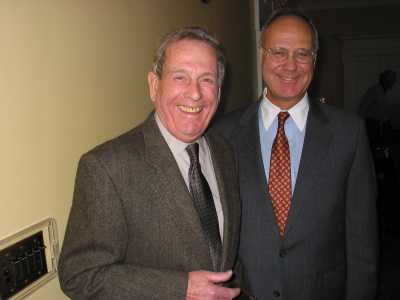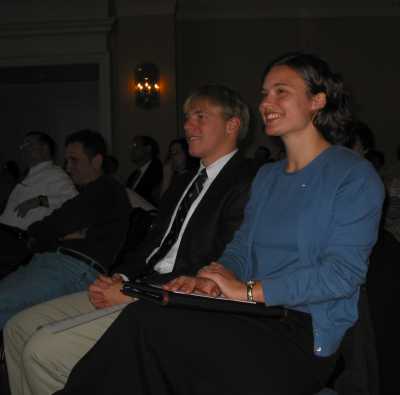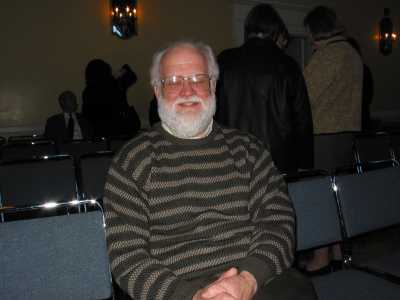|
|
|
||||||||||||||



|
"Three Virginia lawmakers gave an audience of University of Virginia employees a short course Friday in state budget pain. For an hour, the three men elected by voters in Charlottesville and Albemarle County to represent them in the General Assembly explained to UVa workers that the 60-day legislative session beginning Wednesday might tear up one governor's budget only to write another with just as many painful cuts. "It's going to be a tough year," Sen. R. Creigh Deeds, D-Bath County, told the crowd of a few hundred people in UVa's Newcomb Hall Ballroom. "The year's been made tougher in many respects because the budget document that Gov. [Jim] Gilmore released a couple of weeks ago is absolutely the most political budget bill I've ever seen," Deeds said. "That bill, I've heard from Democrats and Republicans alike in the legislature, is pretty much going to have to be written again from fresh cloth." A part-time legislature must find its own creative ways to wipe out a $1.2 billion revenue shortfall in the state budget for the next six months, Deeds said. And that is before it deals with an estimated $50 billion two-year state budget for 2002-2004 that could be $2 billion shy of revenue. He called Gilmore's proposed 50 percent cut in UVa's maintenance reserve budget to care for its buildings "unacceptable." Del.-elect Rob Bell, R-Albemarle County, and Del. Mitchell Van Yahres, D-Charlottesville, each questioned the short-term maintenance fund cut as possibly short-sighted, but they generally agreed with Deeds that some cuts are inevitable. Deeds, who turned 44 on Friday, implied that the pain for state employees denied raises last year might not be as severe as that felt at the beginning of the 1990s, when then-Gov. L Douglas Wilder dealt state institutions, especially public colleges and universities, cuts to help erase a larger budget shortfall. "There is no way to make a commitment about funding of anything this year," said Deeds, a 10-year veteran of the House of Delegates. He said Virginia appears ready to return to economic growth. "Things are already on the upturn," he said. "I'm very hopeful about the next two years, four years and beyond." University President John T. Casteen III told university employees that his administration plans to try to avoid layoffs, as it did when Wilder made cuts during the recession a decade ago. "We went through that without layoffs," Casteen said. "That would be our target this time, too. On paper, the cuts that we've been asked to plan for so far are not as radical as the cuts" under Wilder.
Casteen added that universities then were able to raise tuition to make up for some of their lost revenue from the state and soon launched a large capital fund-raising campaign. "We are working on that sort of a strategy now," he said of the idea of again trying to raise private money in an organized campaign. "The problem is we just wound down a campaign." Casteen said Gilmore's budget would allow universities to raise tuition but then would take the amount of money raised for the state's General Fund in the form of required university savings.
Deeds said Gilmore's plan "doesn't make sense to me." Virginia already is underfunding education at every level, he said. "It's a tax increase," said Van Yahres. "That's just as clear as a bell." He added that universities probably need tuition increases but should not have their hands tied as Gilmore proposed. Bell did not stick up for Gilmore's tuition increase plan either, saying the money from increases "should be to preserve the value of your diploma." The UVa crowd applauded classified worker Wilson E. McIvor after the biology department employee pleaded with lawmakers to fund the pay plan and look at ways to improve its fairness. "If history is any guide, the state's university workers will bear the brunt of any budget balancing that is to be done," McIvor said. "If governor Wilder cut fat, then governor [George F.] Allen cut muscle, and all that's left for you to cut is bone."
Van Yahres said UVa was forced by the Gilmore administration to institute a new classified pay plan without the money needed to fund the salary increases to go along with it. "It goes back to the car tax," Van Yahres said after the forum. He said Gilmore chose to fund tax relief instead of allowing the pay plan to include the raises needed. "I'm for the classified pay plan, but it has to be funded," he said. "They just went ahead with the plan and the governor never put [any money] in it."
Casteen said UVa spent $4.8 million during the first 12 months of the new pay plan. He said it has had a positive impact on UVa employees despite the lack of additional state support. "The state's never put a nickel into it," Casteen said"
(Bob Gibson, The Daily Progress, January 5, 2002).
|



